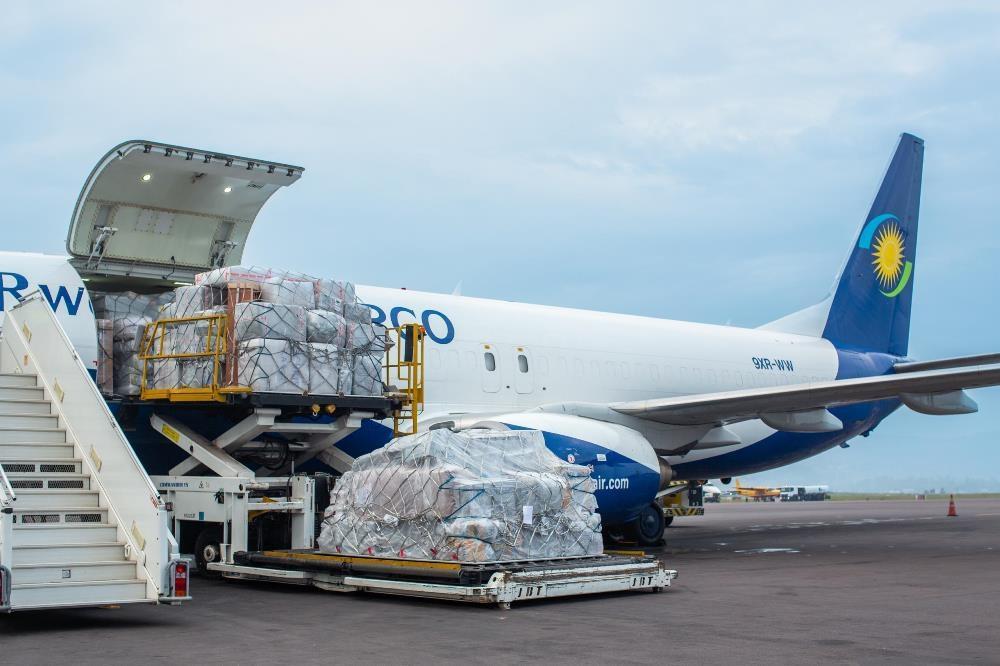Africa-Press – Rwanda. The Minister of Infrastructure, Jimmy Gasore, has acknowledged the need to address logistical challenges – particularly RwandAir’s limited cargo capacity – affecting horticulture exporters.
He made the remarks on August 9 during Prime Minister Justin Nsengiyumva’s visit to Gabiro Agribusiness Hub in Nyagatare District, Eastern Province.
The Gabiro Agribusiness Hub, expected to cover 15,600 hectares in total, 5,600 of which are ready for utilisation thanks to the development of enabling infrastructure, is a flagship initiative by the government of Rwanda, aims to enhance food security, reduce trade imbalances, and create employment.
Among the seven companies operating there – in various agricultural value chains including horticulture – is Kinvest, which raised concerns about limited air freight capacity during the visit.
Kinvest grows horticulture crops namely French beans, passion fruit, and chili, as well as avocado of Hass variety – which it started planting last month and expects to start harvest within three or four years.
Kinvest Managing Partner Jesse Ratichek said that the farm currently can produce 500 tonnes of fresh produce per month, which he said matches RwandAir’s cargo transport capacity.
Given that there are more horticulture exporters both at Gabiro Agribusiness Hub, and other parts of the country, he said that there was a need to expand the cargo capacity to accommodate all the volumes.
“So, in order for large-scale farms oriented towards export to begin to make inroads in major markets, the capacity has to be substantially more,” he said.
Ratichek said that while Kinvest has had a positive relationship with RwandAir, current infrastructure poses challenges as production scales up.
The company, he said, was investing in improved post-harvest logistics, including a charcoal cooling system and energy-efficient cold storage, pointing out that cooling produce on-site will extend shelf life and streamline the supply chain.
At present, harvested fresh produce is loaded directly into refrigerated trucks, transported to Kigali for packing, and then flown to markets in Europe and the UK, using both RwandAir and Ethiopian Airlines.
Direct flights via RwandAir offer higher product quality, while stopover in Addis with Ethiopian Airlines “we notice slightly higher rejection rates from our customers,” an issue he said tends to come from temperature fluctuations in the product resulting from stopover.
He argued that the biggest solution for horticulture exporters would be larger-scale air freighters that can carry produce directly to the international markets, including the European and UK markets, citing wide-body air freighters that can, each, carry 60 tonnes in one flight.
“That will solve a huge number of challenges for us. It’ll allow the produce to arrive fresher. It’ll allow us to process much higher quantities. And then to really book high-end customers that require that kind of volume and that kind of consistency. That bumps up our margins, and then that makes the economics of the whole value chain work better,” he observed.
Responding to the high volume of horticulture produce that exceeds RwandAir’s current cargo freight capacity, Minister Gasore said, “we will work together to see how we can adjust, because this is a good problem for us.”
RwandAir cargo volumes at a glance
Cargo volume transported by RwandAir increased by 33 per cent from 4,595 tonnes in 2023 to 6,113 tonnes in 2024, which further facilitated exporters to reach international markets, according to the 2024 report by Rwanda Development Board (RDB).
Regarding factors that boosted the cargo capacity, the report cited key destinations including the UK and United Arab Emirates (UAE), and increased frequency on regional and international routes, particularly in these two countries.
In April 2025, Bosco Gakwaya, Director of Cargo Services at RwandAir told The New Times that factors that contributed to air cargo volume increase in 2024, include the introduction of cargo freighters in the RwandAir fleet, additional, additional frequency, hence increased capacity, and network expansion to strategic cargo markets such as Brazzaville and Djibouti markets.
Currently, RwandAir operates one dedicated cargo aircraft with a capacity of 23 tonnes, according to the national airline.
Still in April 2025, Robert Rukundo, Chairman of the Horticulture Exporters Association of Rwanda, told The New Times that given that it is projected that there will be more avocado volumes in 2027 and 2028 considering the observed trend, RwandAir should further increase cargo aircraft in its fleet, Rukundo suggested.
Rwanda’s horticulture exports increased by 29.1 per cent to reach slightly over $75 million (approx. Rwf108 billion) in 2023/2024, up from $58.16 million in the previous fiscal year, according to the 2023/24 annual report by the Ministry of Agriculture and Animal Resources.
For More News And Analysis About Rwanda Follow Africa-Press






